The proposal presented by the directors of Okonko Ltd raises several ethical concerns related to transparency, financial reporting, stakeholder interests, and proper corporate governance. Here are eight ethical issues that may arise from their proposal:
Misleading Financial Reporting: The directors’ intention to transfer the relevant proportion of their share of the domestic subsidiary’s losses to retained earnings, knowing that this is contrary to accounting standards, raises concerns about the accuracy and transparency of the company’s financial information. This action could mislead investors and other stakeholders about the company’s true financial position. IFRS 9 outlines the criteria for recognizing and derecognizing financial assets and liabilities. Transferring losses from a subsidiary to retained earnings without proper justification and adherence to IFRS 9 criteria misrepresents the financial position.
Addressing the Issue: Financial statements must be prepared in accordance with accounting standards and provide accurate and reliable information. Transferring losses to retained earnings to improve financial appearance is unethical and can mislead investors and stakeholders.
Manipulation of Retained Earnings: The directors plan to transfer losses from the subsidiary to retained earnings to make the company more attractive to investors. This manipulative practice violates the principle of faithful representation which is a fundamental qualitative characteristics of the financial statement according to the conceptual framework. In addition, IAS 1 requires financial statements to provide a true and fair view. Misrepresenting financial information by transferring losses to retained earnings contradicts this principle.
Addressing the Issue: Retained earnings should accurately reflect the company’s cumulative profits and losses. Manipulating retained earnings misrepresents the company’s true financial performance. The company should adhere to transparency and honesty in financial reporting.
Conflict of Interest The directors’ decision to sell minority interest in Afa-Alhaji Ltd to improve the cash position and boost retained earnings may be influenced by their personal interests rather than the best interests of the company and its shareholders. Selling underperforming assets to manipulate financials and attract investors raises ethical concerns. This raises concerns about potential conflicts of interest and whether the directors are fulfilling their fiduciary duties. IAS 24 “Related Parties Disclosure” sets guidelines for disclosing related party transactions. If the directors’ actions favor personal benefits over transparent decision-making, this could lead to a breach of these guidelines.
Addressing the Issue: Selling shares to boost earnings without addressing the underlying operational issues is a short-term solution that can harm investors in the long run. Ethical behavior requires addressing the root causes of losses rather than artificially boosting earnings.
Selective Disclosure to Attract Investors The directors plan to sell the shares of a domestic subsidiary that has been consistently losing money. Disclosing only selective information that may attract investors while concealing negative aspects of the subsidiary’s performance is unethical. Selling shares of the loss-making subsidiary to boost earnings selectively highlights positive aspects and omits crucial negative information. IAS 1 “Presentation of Financial Statements” requires the presentation of financial statements that fairly represent the financial performance and position of the company. Selective reporting that masks negative information violates this requirement.
Addressing the Issue: The company should provide complete and accurate information to potential investors, including both positive and negative aspects of the subsidiary’s performance. Selective disclosure undermines investor trust.
Maintaining Control Over Loss-Making Subsidiary The directors’ proposal to sell a minority interest in the loss-making subsidiary while maintaining control contradicts ethical corporate governance practices. Selling underperforming assets should involve relinquishing control.
Addressing the Issue: Maintaining control over an underperforming subsidiary to profit from its assets while shifting losses elsewhere goes against transparency and accountability. A more ethical approach would be to address the losses or divest fully.
Lack of due diligence The proposal to sell minority interest in Afa-Alhaji Ltd without conducting proper due diligence on the potential risks and benefits of such a transaction raises concerns about the directors’ decision-making process and whether they are acting in a responsible and prudent manner. Selling a minority interest in the subsidiary without full disclosure of its consistent losses and financial challenges disregards the interests of minority shareholders who may not have complete information.
Addressing the Issue: The directors should prioritize the interests of all shareholders, providing them with transparent and accurate information about the subsidiary’s performance and financial situation before making any decisions.
Lack of Accountability for Losses The lack of transparency surrounding the proposal to sell minority interest in Afa-Alhaji Ltd and transfer the relevant proportion of their share of the domestic subsidiary to the retained earnings raises concerns about whether the directors are being open and honest with shareholders and other stakeholders about their actions and intentions. Transferring losses from the subsidiary to retained earnings allows Okonko Ltd to avoid accountability for the poor performance of the subsidiary. IFRS 10 Consolidated Financial Statements outlines the principles of consolidated financial statements. Transferring losses to avoid proper consolidation or to manipulate financial reporting disregards the intent of this standard.
Addressing the Issue: Companies should be transparent about their performance, addressing losses instead of transferring them to other areas. This accountability fosters ethical behavior and proper corporate governance.
(Any 5 points @ 2 marks each = 10 marks)

